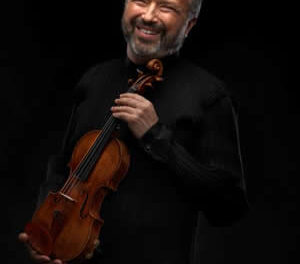It’s not often that the internationally-known headliner of a concert in Durham, North Carolina, merely has to drive a few miles from his home to the venue. Such is the case with Branford Marsalis – three-time Grammy winner, multi-disciplined recording artist, socially conscious citizen and resident of Durham. He joined the Filharmonia Brasileira, conducted by Gil Jardim, in a program featuring the music of Darius Milhaud, Heitor Villa-Lobos, and other Brazilian modernists. This was the finale of a three-concert series called “Brazil 58,” presented by Duke Performances.
Filharmonia Brasileira is a chamber orchestra established in 1994 to champion modern Brazilian composers and also Europeans, like Milhaud, who incorporated American jazz and ethnic Brazilian music in their compositions. The first piece was a somewhat bland affair by Camargo Guarnieri called Abertura Concertante. Written in 1942, this was dedicated to Aaron Copland,but it lacked any passing resemblance to any of Copland’s style or its own internal interest. A major flaw in this orchestra’s performance style also became apparent early on: reliance on a down-the-middle dynamic range that had me wishing I had a remote control to adjust the volume.
The remainder of the first half was taken up with the music of Villa-Lobos, the remarkably prolific composer who is generally considered the greatest of Brazil’s concert composers. Marsalis was the soloist in the Fantasia for Soprano Saxophone. This three movement work was an especially apt choice since a fantasia is written to simulate an improvisatory performance (yes, somewhat of an oxymoron). Marsalis’ golden tone and fluid technique made this a memorable performance. If one were to assign a “greatest hit” to Villa-Lobos. it would undoubtedly be his “Bachianas Brasileiras No. 5.” Originally written for soprano and eight celli, it was also arranged by the composer for solo guitar and soprano and then followed by a slew of adaptations for various ensembles by others. The opening Aria is a long cantilena melody accompanied by gentle pulsating Brazilian rhythms. The strings gave a light but propulsive background to Marsalis’ soaring vocal line. The lesser performed Dansa (Martelo) second movement was equally compelling and rhythmically tight.
During intermission, you could tell that many persons in attendance felt that they were sold a defective bill of goods. I heard the comment “I thought this was going to be a jazz concert” several times, and many people looked bored and disappointed. That didn’t improve very much till the last part of the concert, when Marsalis really got to let go and display his prodigious jazz chops. Before that, the performance of Milhaud’s La Creation du Monde, which included Marsalis on alto sax in the orchestra, was disturbingly uninspiring.
Perhaps the best part of the orchestra – at least during this evening’s performance – was the rhythm section consisting of Neimar Dias on bass and percussionists Vinicius Barros and Glaucia Vidal. Branford Marsalis again demonstrated the absurdity of musical barriers and demonstrated his authenticity and versatility in several styles. Those who want to experience this great artist in a straight-ahead jazz performance may catch him and his quartet at Memorial Hall on the UNC Chapel Hill campus on February 27, 2009.











